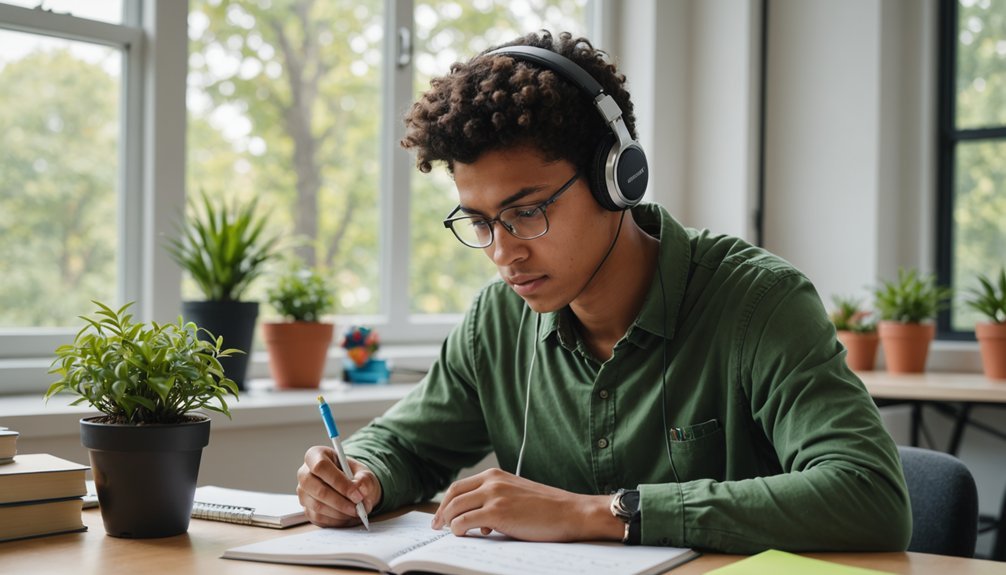Effective studying is more than just reading a textbook or highlighting notes—it’s about using smart strategies that engage your brain. For college students, learners, or anyone managing multiple courses and study materials, active techniques like self-testing, spaced practice, and teaching others can dramatically improve memorization, focus, and performance.
These methods don’t just help you learn—they transform how you think and retain information. When you summarize key points, take practice tests, or explain a chapter aloud, you’re doing more than reviewing; you’re building skills far beyond the exam.
Whether studying in the library, forming a study group, or working alone at home, these science-backed approaches will help you manage your time, sharpen your focus, and truly understand your subject.
Key Takeaways
- Active engagement techniques like teaching aloud and self-testing demand more cognitive involvement, leading to increased focus.
- Spacing study sessions prevents cognitive overload, maintaining sharper focus and better memory retention.
- Personalized study environments and eliminating distractions minimize external interferences, enhancing concentration on the learning task.
- Mixing study techniques keeps the brain engaged by varying the method of content interaction, which prevents monotony and boosts focus.
- Techniques such as the Feynman Technique simplify complex information, making learning more manageable and focused.
Embracing Active Engagement for Deeper Learning
To truly grasp and retain new information, you might find it beneficial to immerse yourself in active engagement techniques rather than sticking with passive study methods like simply rereading your notes. Engage with active studying methods such as teaching aloud or constructing concept maps, which enhance comprehension and retention.
These techniques encourage a deeper cognitive processing of the material. By integrating self-testing and retrieval practice, you’re reinforcing your knowledge and strengthening neural connections vital for long-term memory. Additionally, incorporating spaced practice into your study routine allows your brain time to form connections between concepts, ensuring that each review session deepens your understanding and solidifies information in your memory.
The Power of the Study Cycle and Distributed Practice
Mastering the stages of the Study Cycle streamlines your learning process and deepens your understanding of the material. By spacing your study sessions, you avoid the stress of cramming and boost your long-term retention of information. This strategic approach to learning harnesses the benefits of both the effective cycle stages and distributed practice.
Effective Cycle Stages
Understanding the Study Cycle and the practice of distributed learning can greatly boost your educational success. By integrating effective study habits into each stage—previewing, attending class, reviewing, studying, and checking understanding—you’re setting yourself up for deeper comprehension and long-term retention. Don’t skip the preview; it primes you for what’s ahead, enhancing your grasp during lectures.
Diverse activities across these stages, like reading and listening, keep your engagement high. Embrace distributed practice; spacing your study sessions fosters much stronger memory recall than cramming. Regularly checking your understanding through self-assessment reinforces what you’ve learned and highlights areas needing more attention, making your study sessions more targeted and effective.
Benefits of Spacing
Building on the foundation of the Study Cycle, the benefits of spacing your learning activities cannot be overstated. By integrating the spacing effect into your study strategies, you’re setting yourself up for a more robust memory and efficient learning process. Here’s how:
- Enhanced Retention: Spacing helps improve your memory by allowing time for information consolidation.
- Avoids Cramming: Frequent, shorter study sessions prevent the need for long study sessions that can lead to fatigue and diminished focus.
- Increases Engagement: Alternating study types (reading, listening) keeps your brain active.
- Sustainable Habit: A regular, spaced study routine is easier to maintain and less overwhelming than irregular, intense studying periods.
Enjoy the journey of learning with these strategic adjustments!
Maximizing Focus Through Intensive Study Sessions

College students often struggle with focus, especially during long study marathons. Instead, short, structured study sessions of 30 to 45 minutes allow students to manage their time, avoid fatigue, and retain more course materials. These bursts enhance memorization and attention span, making study time more effective. This method works well across different classes and subjects, especially when combined with self-testing and summarization.
Incorporate self-testing into these sessions to boost your retention markedly. Here’s a quick guide:
| Technique | Benefit | Duration |
|---|---|---|
| Intensive Study | Maximizes focus & engagement | 30-45 min |
| Self-Testing | Enhances retention | 10-15 min |
| Breaks | Reduces cognitive fatigue | 5-10 min |
The Impact of Study Environment on Cognitive Performance
Your study environment is essential to how well you absorb and retain information. Ensuring ideal noise levels, organizing your physical space, and setting appropriate lighting and comfort can dramatically affect cognitive performance. It is important to adjust these elements to fit your learning preferences to maximize productivity.
Optimal Noise Levels
Understanding how noise levels affect your cognitive performance is essential when setting up your study space. Research shows that a moderate background noise, like that of a busy café, can boost your creativity and overall cognitive function by providing just enough distraction to stimulate your mind without overwhelming it. However, too much noise can disrupt concentration and negatively impact your memory.
- Experiment with noise levels: Find what stimulates your focus without causing distraction.
- Consider background music: Soft instrumental tunes might enhance your concentration.
- Assess your preference: Everyone’s different; what works for others might not work for you.
- Monitor your performance: Track how well you retain information under different noise conditions.
Physical Space Organization
A clutter-free desk sets the stage for effective studying by minimizing distractions and enhancing focus. When your study environment is well-organized, you’re not just tidying up physical space; you’re also clearing mental clutter, improving your concentration, and retention. Personalized study spaces allow you to tailor your surroundings to your learning preferences, greatly boosting your engagement and effectiveness.
| Emotion | Cluttered Space | Organized Space |
|---|---|---|
| Stress | High | Low |
| Focus | Poor | Sharp |
| Engagement | Distracted | Immersed |
| Comfort | Uncomfortable | Relaxed |
| Retention | Weak | Strong |
Experiment with different setups to discover what truly works for you, deepening your understanding of the material.
Lighting and Comfort
A well-lit, comfortable study space enhances learning, especially when reviewing dense textbooks or practicing summarization techniques.
What College Students Should Focus On:
- Natural Lighting improves alertness and comprehension of study materials.
- Ergonomic Setup prevents discomfort during extended focus sessions.
- Structured Layout ensures your space is designed for clear thinking and time management.
- Avoid Overcomfort: Avoid overly cozy spots like beds or sofas; they reduce mental engagement and can harm your study structure.
Strategies to Eliminate Distractions and Enhance Concentration
Effective time management isn’t just about when you study—it’s also about how well you eliminate distractions. Many college students struggle with focus due to multitasking, unstructured planning, or constant digital interruptions.
Here are proven strategies that help learners stay focused and improve memorization and comprehension:
Top Focus Tips for College Students:
- Silence Digital Noise: Use focus apps to block social media and limit access to distracting platforms while reading textbooks or doing practice tests.
- Set a Specific Goal: Plan what you want to accomplish—e.g., summarize a chapter or complete 20 questions.
- Use Timed Sessions: Apply the Pomodoro method (25/5 intervals) for structured study planning.
- Know Your Peak Hours: Some students study best in the morning, while others study at night. Identify your best time.
- Rotate Spaces: Switch between your room, library, or campus areas to maintain novelty and energy.
- Join a Study Group: Being part of a peer community offers support, accountability, and shared ideas.
Example: One student reduced distractions by turning off phone notifications, setting daily study goals, and using group chats only for urgent coursework discussions.
Leveraging Teaching and Self-Examination Techniques for Better Retention

Two of the most effective study skills that improve retention for college students are teaching others and self-testing. These active learning strategies turn you into a participant, not a passive note reader, boosting comprehension and memory.
How to Use Teaching and Testing Effectively
- Teach What You Learn
- Use the Feynman Technique: Explain the subject to a friend or yourself in simple language. This will reveal gaps in your understanding and show what needs clarification.
- Example: Try using visual summaries to teach a chapter from your textbook to your study group.
- Use the Feynman Technique: Explain the subject to a friend or yourself in simple language. This will reveal gaps in your understanding and show what needs clarification.
- Use Practice Tests and Flashcards
- Create your practice test from your class notes, course materials, or textbook chapters.
- Focus on answering questions, identifying weak areas, and repeating the cycle regularly.
- Great for subjects that require high memorization (e.g., biology, history, psychology).
- Create your practice test from your class notes, course materials, or textbook chapters.
- Summarization After Study Sessions
- Summarize what you learned using keywords, bullet points, or even create infographics.
- Use summarization to prepare for larger exams or final reviews.
- Summarize what you learned using keywords, bullet points, or even create infographics.
Example: After each class, one student summarized the lecture in five key points, then taught those concepts to a peer and tested themselves using flashcards. This habit helped them retain more and score higher.
Frequently Asked Questions
Which Is the Most Effective Study Technique?
The most effective study technique depends on your learning style, but active approaches like self-testing and spaced practice often yield the best results. These methods keep you engaged and help solidify your understanding over time. Try mixing techniques such as the Feynman Technique and SQ3R to cover all bases. Experiment to see what works best for you and use it to enhance your learning outcomes.
What Are the Benefits of Study Techniques?
Effective study techniques boost focus, comprehension, and memory retention. Methods like spaced practice help your brain process information over time, enhancing long-term retention. Techniques such as self-testing and teaching others reinforce your understanding and guarantee you remember information longer. Plus, using visual aids like mind maps aligns with your brain’s processing patterns, making recall easier during exams.
What Is the 1/2/3 Method for Studying?
The 1/2/3 Method for studying breaks your study material into three parts. You’ll review the first section for 1 minute, the second for 2 minutes, and the third for 3 minutes. This method helps you maintain focus by varying the intensity of your study sessions and promotes better retention through spaced repetition. Compared to traditional cramming, it’s especially effective for enhancing long-term memory and avoiding burnout.
What Helps You Focus When Studying?
To enhance your focus while studying, create a quiet, distraction-free environment and manage your time by breaking sessions into shorter intervals with breaks. Active engagement methods, such as self-testing or explaining concepts aloud, can keep you focused. Trying different study settings and maintaining hydration with snacks like fruits and nuts can also help. Find what works for you, as everyone’s ideal study conditions vary. Additionally, consider setting specific goals for each study session to maintain motivation and track progress. Utilizing tools such as planners or digital apps can help organize your objectives and deadlines. Ultimately, discovering the best strategies for studying effectively involves experimentation and self-awareness, allowing you to adjust to your learning style.
Conclusion
You’ve seen how various study techniques can sharpen your focus and deepen your learning. By actively engaging with your material, organizing your sessions, and optimizing your environment, you enhance your ability to concentrate and retain information. Remember, teaching others and testing yourself are powerful tools to solidify your knowledge. So, keep your study sessions lively, minimize distractions, and trust these strategies’ power to transform your academic performance. Keep pushing forward, you’ve got this!




















